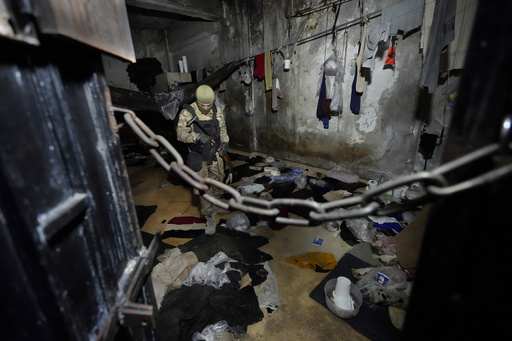Top diplomats from the United States, along with representatives from the Arab League and Turkey, convened in Jordan on Saturday to strategize on aiding Syria’s transition following the recent downfall of Bashar Assad’s regime. Notably, no Syrian officials participated in the talks.
The end of the Assad family’s rule, which lasted over fifty years, has ignited concerns about rising instability within a region already destabilized by the ongoing Israel-Hamas conflict in Gaza, as well as tensions between Israel and Hezbollah, despite a fragile ceasefire in place.
U.S. Secretary of State Antony Blinken acknowledged that American officials have been in direct communication with the Syrian insurgent faction responsible for Assad’s ousting. However, this group continues to be labeled a foreign terrorist organization by the U.S. and other nations. An insurgent leader, participating in a recent interview with Syrian television, did not confirm any dialogue with the U.S. but cautioned Israel regarding the numerous airstrikes it has executed in Syria recently.
The United States is also reigniting its push for a ceasefire in Gaza, where millions of Palestinians face a dire humanitarian crisis due to the ongoing conflict.
In recent developments, reports surfaced that loyalists to Bashar Assad attacked members of a Syrian insurgent faction in the coastal region, resulting in 15 casualties on Saturday. The Syrian Observatory for Human Rights, based in Britain, indicated that the attack targeted the Failaq al-Sham group, which was instrumental in the actions leading to the recent overthrow of Assad. This coastal territory is predominantly inhabited by Assad’s Alawite sect. Citizen journalist Taher al-Omar reported that Failaq al-Sham members were ambushed near Jableh by “sectarian gunmen,” with no specifics about the incident disclosed.
In Gaza, Israeli airstrikes reportedly killed at least 11 people, with four fatalities linked to a strike on a tent in Deir al-Balah, as confirmed by an Associated Press journalist who was at the hospital where the bodies were taken. Other medical sources indicated that an airstrike in Gaza City killed another seven, including a mother and her infant, at a school sheltering displaced families. Ataf Saadat, a woman staying at the school, recounted the devastating aftermath, stating that the deceased infant was merely two days old.
A joint statement from the recent ministerial meeting on Syria emphasized the need for ceasing hostilities and expressed support for a locally led political transition. Held in Jordan and participated in by various Arab nations, the U.S., Turkey, and the European Union, the statement underlined the importance of preventing extremist factions from resurfacing in Syria and ensuring the safe elimination of chemical weapons stockpiles, while affirming Syria’s territorial integrity. A separate declaration by Arab foreign ministers urged the establishment of U.N.-supervised elections based on a new constitution, condemning Israel’s recent interventions as “heinous occupation” and demanding the withdrawal of its forces.
In related remarks, the leader of Hezbollah acknowledged that the fall of Assad has disrupted a significant supply route but expressed confidence in finding alternative methods for arms procurement. Hezbollah has historically supported Assad, deploying numerous fighters to Syria throughout the conflict. In a televised address, Hezbollah leader Naim Kassem noted the loss of the supply chain but left open the possibility of reestablishing it under the new Syrian authority, while also hoping that this government will view Israel as a foe.
The head of the insurgent group that helped dethrone Assad, Ahmad al-Sharaa, stated that while they are not seeking conflict with Israel, they believe the pretexts for Israeli airstrikes in Syria have dissipated. He acknowledged that about 400 airstrikes have heavily damaged the Syrian military’s capabilities, emphasizing that new authorities in Damascus are in communication with Western embassies and are contemplating plans for Syria’s reconstruction.
During a press conference in Jordan, Blinken confirmed that U.S. officials have engaged with the Syrian insurgent group that spearheaded the movement against Assad. He refrained from disclosing specific details but underscored the necessity of communicating with the group regarding their governance approach during the transition period.
Additionally, medical officials in Gaza reported the fatalities of at least 10 individuals due to an Israeli strike that targeted a municipal meeting in central Gaza. Among the deceased were a mother and her young daughter, further highlighting the devastating impact of the ongoing military actions.
In a notable development, Turkey announced the reopening of its embassy in Syria, making it the first nation to do so following Assad’s departure. The Turkish flag was raised in Damascus, marking a significant shift after diplomatic relations were severed in 2012 due to the civil war’s insecurity. While some nations have maintained ties with Assad during the decade-long conflict, others have sought to normalize relations in recent years.
As Blinken concluded his regional tour in Aqaba, he emphasized a shared understanding among regional partners regarding the need for an inclusive new government in Syria that values minority rights, denounces terrorism, and addresses the legacy of chemical weapons under Assad’s regime. In discussions with U.N. Special Envoy for Syria Geir Pederson, he expressed optimism for a credible political process that unites the diverse communities in Syria while ensuring state institutions’ resilience and swift humanitarian assistance deployment.
The Jordanian Foreign Ministry reiterated the goal of fostering a comprehensive politically led process by the Syrian people, aiming for the reconstruction of state institutions and the preservation of Syria’s sovereignty and unity, alongside the rights of all citizens.
